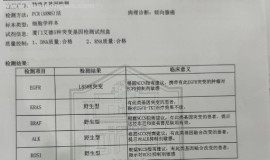An update of clinical data from the rociletinib Phase 1/2 study were presented in early June in an oral session at the American Society of Clinical Oncology (ASCO) Annual Meeting. Highlights from the data presented for evaluable, centrally-confirmed T790M positive patients treated at a therapeutic dose of rociletinib included a 58 percent objective response rate, and a 90 percent disease control rate. The median duration of response could not yet be determined, and similarly, median progression-free survival (PFS) had not yet been reached. However, follow-up for some patients exceeded one year and the estimate for median PFS was greater than 12 months. Rociletinib is well-tolerated, with no evidence of wild-type EGFR inhibition. The most common adverse events were nausea, hyperglycemia, diarrhea, vomiting and decreased appetite, and these were mostly grade 1 or 2 in severity.
Rociletinib is the only EGFR-directed therapy to spare wild-type EGFR in clinical studies, which the Company believes represents a significant point of differentiation from approved EGFR inhibitors and those currently in clinical development.
The next update of CO-1686 clinical data is expected to take place at the 26th EORTC-AACR-NCI Symposium on Molecular Targets and Cancer Therapeutics in Barcelona in mid-November.
The Company is currently enrolling two Phase 2 expansion cohorts of its Phase 1/2 study in EGFR mutant patients with the T790M mutation; the first includes approximately 150 to 200 T790M positive patients directly after progression on their first and only TKI therapy, comparable to the TIGER2 registration study patient population. The second cohort includes approximately 150 to 200 later-line T790M positive patients after progression on their second or later TKI therapy or subsequent chemotherapy. Both cohorts are exploring doses of 500mg, 625mg and 750mg BID. The TIGER2 study, in T790M positive patients directly after progression on their first and only TKI therapy, began enrolling patients earlier in the second quarter at a dose of 625mg BID.
Data from the expansion cohorts, combined with data from TIGER2, are expected to serve as the basis of an NDA submission for rociletinib by mid-2015.
In May, the U.S. FDA granted Breakthrough Therapy designation for rociletinib as treatment for mutant NSCLC in patients with the T790M mutation after progression on EGFR-directed therapy.
Clovis expects to initiate two more studies in the TIGER program during 2014. The TIGER1 study, a randomized Phase 2/3 registration study of rociletinib versus erlotinib in newly-diagnosed EGFR mutant patients is expected to begin shortly. The TIGER3 study, a randomized, comparative study of rociletinib versus chemotherapy in patients with EGFR-mutant NSCLC and acquired TKI resistance, is expected to begin during the second half of 2014. In addition, the Company initiated its Phase 1 study of rociletinib in Japan earlier this year. |


